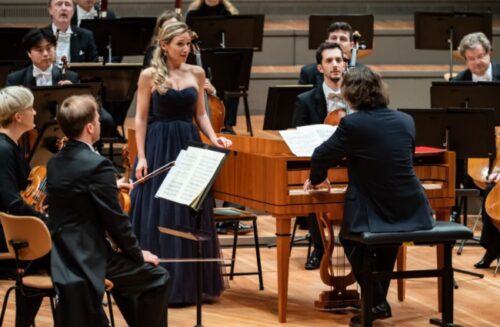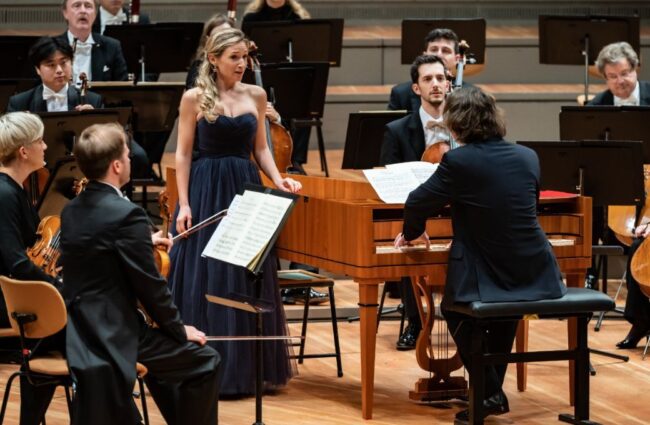 Germany Mozart: Sabine Devieilhe (soprano), Berlin Philharmonic Orchestra / Maxim Emelyanychev (conductor). Livestreamed from Philharmonie Berlin, viewed on the Digital Concert Hall, 29.10.2022. (GT)
Germany Mozart: Sabine Devieilhe (soprano), Berlin Philharmonic Orchestra / Maxim Emelyanychev (conductor). Livestreamed from Philharmonie Berlin, viewed on the Digital Concert Hall, 29.10.2022. (GT)

Mozart – Le nozze di Figaro K.497: Overture; ‘Oiseaux, si tous les ans’, arietta, K.307; Idomeneo, K. 366: ‘Zeffiretti lusinghieri’, Ilia’s aria; Serenade in D major, K.239 ‘Serenata notturno’; Die Entführung aus dem Serail, K.384, Konstanze’s aria; Cantata, K.427, ‘Et incarnatus est’; Symphony No. 38 in D major, K.504 ‘Prague’
In recent concert seasons, audiences have been blessed by the outstanding talents of the conductors that we have in Scotland. I have in mind Thomas Søndergård and Elim Chan at the Royal Scottish National Orchestra and the young Russian Maxim Emelyanychev at the Scottish Chamber Orchestra. Last season Søndergård made his debut with this world-class orchestra, and tonight it was the turn of ‘our’ Maxim Emelyanychev in a programme much similar to those he regularly directs in Scotland.
The opening of the Le nozze di Figaro overture was thrilling with the Russian conductor taking a super-fast tempo – strangely, I recall Yevgeny Mravinsky directing this piece at the same barnstorming pace! The speed didn’t upset the Berlin Philharmonic’s musicians, and it was lovely to see how they were relishing the performance. The orchestra were seated in a tight semi-circle around the conductor. Emelyanychev was constantly guiding the flow of the music with his hands and gesticulating fingers and through his eyes – capturing a hypnotic connection with his musicians. Without using a rostrum, his energy was captivating and enjoyable to watch as he exposed all the delightful colours of Mozart’s score.
In the pre-concert interviews, I was surprised that Emelyanychev and the French soprano Sabine Devieilhe said they had not worked together before. Emelyanychev said that this debut concert with the Berlin Philharmonic was ‘interesting as it is [always] different with every orchestra, I saw this orchestra first on video tapes, and also when they later came to Moscow, and when I am in Germany I come to hear them.’ He thought that a distinct quality of the orchestra is, ‘there is great communication between the musicians.’ The Russian said that for him the Mozart programme was special, because when he was singing in a boys’ choir, they gave him a nickname of ‘Mozart’. ‘There is so much flowing in his music, it’s [written] in different styles’. Devieilhe, who was also making her debut here in Berlin, said that her performance was unique because of the ‘fluidity of the programme, and she pointed out that in the ‘Et incarnatus est’ from the Cantata, ‘there was a wonderful dialogue with the woodwind.’
In her opening arietta, ‘Oiseaux, si tous les ans’, the Russian accompanied persuasively at the harpsichord as Devieilhe sang with her beautifully expressive and sensitive soprano. In the second aria, she moved to the front of the stage to sing Ilia’s aria from Idomeneo ‘Fluttering zephyrs…oh so gentle’ with the orchestra now playing a softly gentle pianissimo in a passage of complete harmony with the graceful fragrance of Mozart’s score.
The conductor left the stage for the orchestra to play ‘Serenata notturno’ with the leader Krzysztof Polonek introducing the opening dramatic Marcia, followed by the Menuetto, with the music-making led by the quartet of Polonek and Christophe Horák on violins, Naoko Shimizu on viola and Janne Saksala on double bass all contributing to a charmingly harmonious passage, with especially great virtuosity from Polonek. The Rondo was distinguished by wonderful string playing, and closed, not without humour, on the timpani of Wieland Wetzel.
Konstanze’s aria from Die Entführung aus dem Serail, ‘Ach, ich liebte’ was splendidly portrayed by Devieilhe in complete character with her part, and capturing the challenging high Cs effortlessly, supported well by the exquisite accompaniment by Emelyanychev and the orchestra. The soprano moved back into the orchestra for ‘Et incarnatus est’ from Mozart’s Cantata, now singing in Latin – the fourth language of her performance – yet shifting into the character without any trouble. Her singing was charming and there were superb solos from the oboe of Wenzel Fuchs and the flute forming a dialogue with the soprano.
In the ‘Prague’ Symphony – as he often does in Glasgow with his SCO – Emelyanychev started conducting the opening Adagio – Allegro movement before the applause had stopped by instantly beginning the almost demonic opening bars, and then quickly switching to an elegiac passage with Emelyanychev conjuring delightful play from the woodwinds and enticing bold strokes from the timpani in a build-up in drama heralding the wonderfully graceful singing theme on the strings. Immediately moving to the second movement (Andante) in a passage of beautiful string playing, there was a sequence of noble intonation from the elegiac flutes and bassoons.
In the Presto finale, impelled ferociously by the conductor, the lively flutes and horns were as if playing for their lives. Emelyanychev evinced the demonic form of Mozart’s writing – and imparted by his energy and constant movement on stage – his dynamic temperament summoned dramatic thuds on the timpani, heralding a terrific, exciting climax. Notable features of this concert were the audience applauding between the movements, which seldom happens at Berlin Philharmonic concerts, although it was a feature during this year’s Musikfest. As in Glasgow, it seems the Russian overwhelms his listeners with the sheer emotion and excitement of his music-making. It was a remarkable debut for Emelyanychev and will lead to more invitations from this great orchestra.
Gregor Tassie
